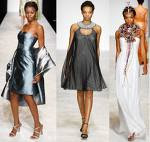Fashion refers to the styles and customs prevalent at a given time. In its most common usage, "fashion" exemplifies the appearances of clothing, but the term encompasses more. Many fashions are popular in many cultures at any given time. Important is the idea that the course of design and fashion will change more rapidly than the culture as a whole. Fashion designers create and produce clothing articles.
The terms "fashionable" and "unfashionable" were employed to describe whether someone or something fits in with the current or even not so current, popular mode of expression. However, more so in the modern era items termed 'not so current' may indeed fit into the term 'Retro.' Retro fashion allows rule shifts, such as 'old is suddenly new,' thus fashionable. The term "fashion" is frequently used in a positive sense, as a synonym for glamour, beauty and style. In this sense, fashions are a sort of communal art, through which a culture examines its notions of beauty and goodness. The term "fashion" is also sometimes used in a negative sense, as a synonym for fads and trends, and materialism. A number of cities are recognized as global fashion centers and are recognized for their fashion weeks, where designers exhibit their new clothing collections to audiences. These cities are
Areas of fashion
Fashion as social phenomena is common. The rise and fall of fashion has been especially documented and examined in the following fields:
Architecture, interior design, and landscape design
Arts and crafts
Body type, clothing or costume, cosmetics, personal grooming, hairstyle, and personal adornment
Dance and music
Forms of address, slang, and other forms of speech
Economics and spending choices, as studied in behavioral finance
Entertainment, games, hobbies, sports, and other pastimes
Etiquette
Fast fashion
Management, management styles and different ways of organizing
Politics and media, especially the topics of conversation encouraged by the media
Philosophy and religion: although the doctrines of religions and philosophies change very slowly if at all, there can be rapid changes in what areas of a religion or a philosophy are seen as most important and most worth following or studying.
Social networks and the diffusion of representations and practices
Sociology and the meaning of clothing for identity-building
Technology, such as the choice of computer programming techniques
Hospitality industry, such as designer uniforms custom made for a hotel, restaurant, casino, resort or club, in order to reflect a property and brand.
Of these fields, costume especially has become so linked in the public eye with the term "fashion" that the more general term "costume" has mostly been relegated to only mean fancy dress or masquerade wear, while the term "fashion" means clothing generally, and the study of it. This linguistic switch is due to the so-called fashion plates which were produced during the Industrial Revolution, showing novel ways to use new textiles. For a broad cross-cultural look at clothing and its place in society, refer to the entries for clothing, costume and fabrics. The remainder of this article deals with clothing fashions in the Western world.
.jpg)